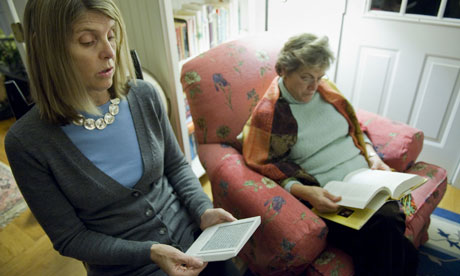
For the last week or so the front of Amazon.co.uk has been proclaiming the launch of the new Kindle e-reader. Apparently it's the "smallest, lightest, fastest, most affordable Kindle yet", with "faster page turns", a screen that "reads like real paper" and "free cloud backup". But, as Bill Ray points out on the Register , the new slimline body is missing a vital feature: the keyboard.
It seems that instead of doing "things that the book could never do" of becoming a "new way of interacting with textual content … [which] invited consumer participation", instead of making the reading community part of the writing process, people have been using the Kindle to, erm, "read books, lots of books".
Of course there's nothing wrong with reading books, in fact you might say that here on the Books desk we're broadly speaking in favour, but if Jeff Bezos is rowing back from a post-Gutenberg, interconnected vision of the book as networked object, where does that leave the future of narrative?
Back in the day, the internet promised "a world of success and romance … for the price of phone call" and hypertext markup looked like it would unleash a new wave of fictional experiments like Geoff Ryman's 253. Fifteen years later, the linear narrative seems more entrenched than ever. For Andrew Gallix the trouble started in 1997 when Mark Amerika drove a wedge between digital and literary pioneers with his navigable multimedia story, Grammatron, while for Sam Jordison the trouble goes deeper, with the complicated nature of the reader as protagonist putting interactivity unavoidably at loggerheads with narrative. Few would argue with Kate Pullinger when she says "there has been a time-lag between what is possible, and what people are actually doing", or with James Campbell when he complains the iPad version of On the Road leaves "the imagination grounded by facts and technological distraction".
So perhaps the future of narrative is social. The Society of Authors has been creating short stories via Twitter in protest at the BBC's planned reduction in short stories, curated by writers such as Joanne Harris, Sarah Waters and Ian Rankin. The stories have been great fun, though perhaps more effective as campaigning tool than art, but perhaps the future of fiction is in collaborative projects which allow us to make future fiction ourselves. Or maybe, as Paul Lafarge suggests, hypertexts are just hard. But if he's right when he argues that ebooks not only "fit with life now", but also "offer writers technical possibilities that, being human, we're going to be unable to resist" then where is the good stuff? Maybe the tools are already all around us, it's just a question of pushing them in the direction of interactivity, or in the direction of fiction. Or perhaps the future of fiction will return to the past – as Bezos seems to think – the only interaction required the use of your imagination and turning the page.

